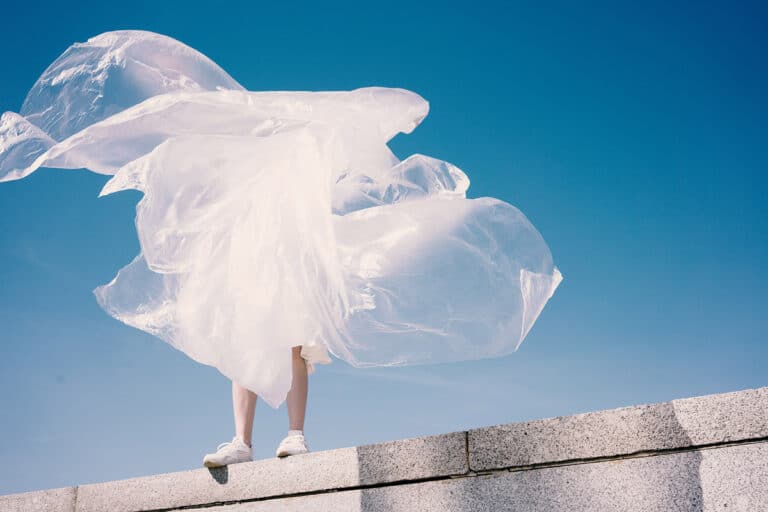Is ‘ethical’ fashion brand House of Sunny really green?

Fashion brand House of Sunny took the internet by storm in the summer of 2020. The vibrant green Hockney dress, made popular by Kendall Jenner, became what many called the “cult dress of the summer.” A dress that also found its way into my own wardrobe. Although the brand was initially launched in 2011, it has skyrocketed in demand over the last few years. This is in part due to the influence of such celebrities, but also because of the brand’s distinct 70s inspired style, the Y2K revival, and most importantly, its commitment to ethical fashion.
View this post on Instagram
House of Sunny’s creative director and founder Sunny Williams has been celebrated, and rightfully so, for the eco-friendly direction he has taken with the company. In a 2020 interview with British Vogue, Williams stated that “we try to avoid wastage where possible, and our goal is to only develop and produce small and precise edits. This has always been at the forefront of what we do.” This is in reference to House of Sunny’s two seasonal collection rule; its aim is to slow down the means of production so that the brand can focus on sustainable fabrics and manufacturing methods. This is unlike other fast fashion companies like Zara or H&M.
House of Sunny also advertises other incredible ethical responsibilities such as using recycled materials (its bags are compostable) and new technologies, animal welfare, ethical labour, reducing its carbon footprint, and fabric wastage. So, when a company makes a decision to shift into a more environmentally ethical model, we should celebrate, right? Not always. Are companies actually being ethical or are they simply greenwashing?
So what is greenwashing?
Jay Westervelt first coined the term greenwashing in 1986, but what exactly does this mean? The current greenwashing definition in the Cambridge Dictionary describes it as “behaviour or activities that make people believe that a company is doing more to protect the environment than it really is.” It calls into question whether companies like House of Sunny are really putting in the work towards sustainability or are just on a big ‘green’ marketing campaign. If a consumer feels better about their purchase being a ‘green’ one then they are more likely to repurchase from that same brand. It’s a win-win situation for the brand.
How to spot greenwashing
Amina Razvi, Executive Director of the Sustainable Apparel Coalition, told Vogue, “It’s easy to say something is sustainable and not have to prove it, it’s not backed up by real credible data.” Be wary of those constantly used buzzwords, we’ve heard them all by now: ‘green’, natural, sustainable, eco-friendly, biodegradable, etc. Instead, research those companies; look at the numbers, and decide for yourself if they are really doing enough. Some of these words can be incredibly misleading to consumers looking to shop more sustainably (myself included).
View this post on Instagram
So let’s look at the numbers
Good On You is a platform that provides trusted sustainability ratings for fashion brands and is backed by celebrities like Emma Watson. Unfortunately, House of Sunny doesn’t rank as highly as you would think. Good On You rates the brand as overall ‘not good enough,’ giving it a 2 out of 5 for both its planet and people categories but a 4 out of 5 for its animal category. This scale is defined as, “1 (we avoid) to 5 (great).”
Looking further, I decided to delve deeper as to why this might be the case. Although House of Sunny has made huge waves with its compostable bags and new denim technologies, its fabrics are still largely made of arguably unsustainable materials. Acrylic, nylon, and Polybutylene Terephthalate (PBT) knit seem to be dominant materials in a majority of the brand’s line; although it claims to source recycled or ethical versions there doesn’t seem to be any evidence to actually prove that. These synthetic ingredients are also not biodegradable, with one 2019 study stating that “synthetic clothes contribute by about 35 [per cent] to the global release of primary microplastics to the world’s oceans, thus becoming the main source.”
View this post on Instagram
Although House of Sunny is making an impact as a slow fashion brand, it can’t seem to completely escape our fast-fashion world. Dupes of its most iconic pieces are popping up everywhere. Fashion presenter and TikTok user Annalise Dayes documented her shock at finding a dupe of the Hockey dress already in a charity shop. Her video highlights how quickly these trends are coming and going; consumers will buy something trendy and throw it out when it’s not. Don’t even get me started on the brand’s Peggy cardigan.
@annaliesedayes Trends are moving super fast! #fashiontok #houseofsunnydupe #charityshop #slowfashion
♬ Face Dance - Funny Tok
House of Sunny has definitely had an impact on the conversation of sustainability and its achievements cannot be ignored—for now, the conversation surrounding the fashion industry and sustainability is more about progress than perfection. That being said, it is vital for us as consumers to hold brands accountable for their environmental failures. If not us, who will?




